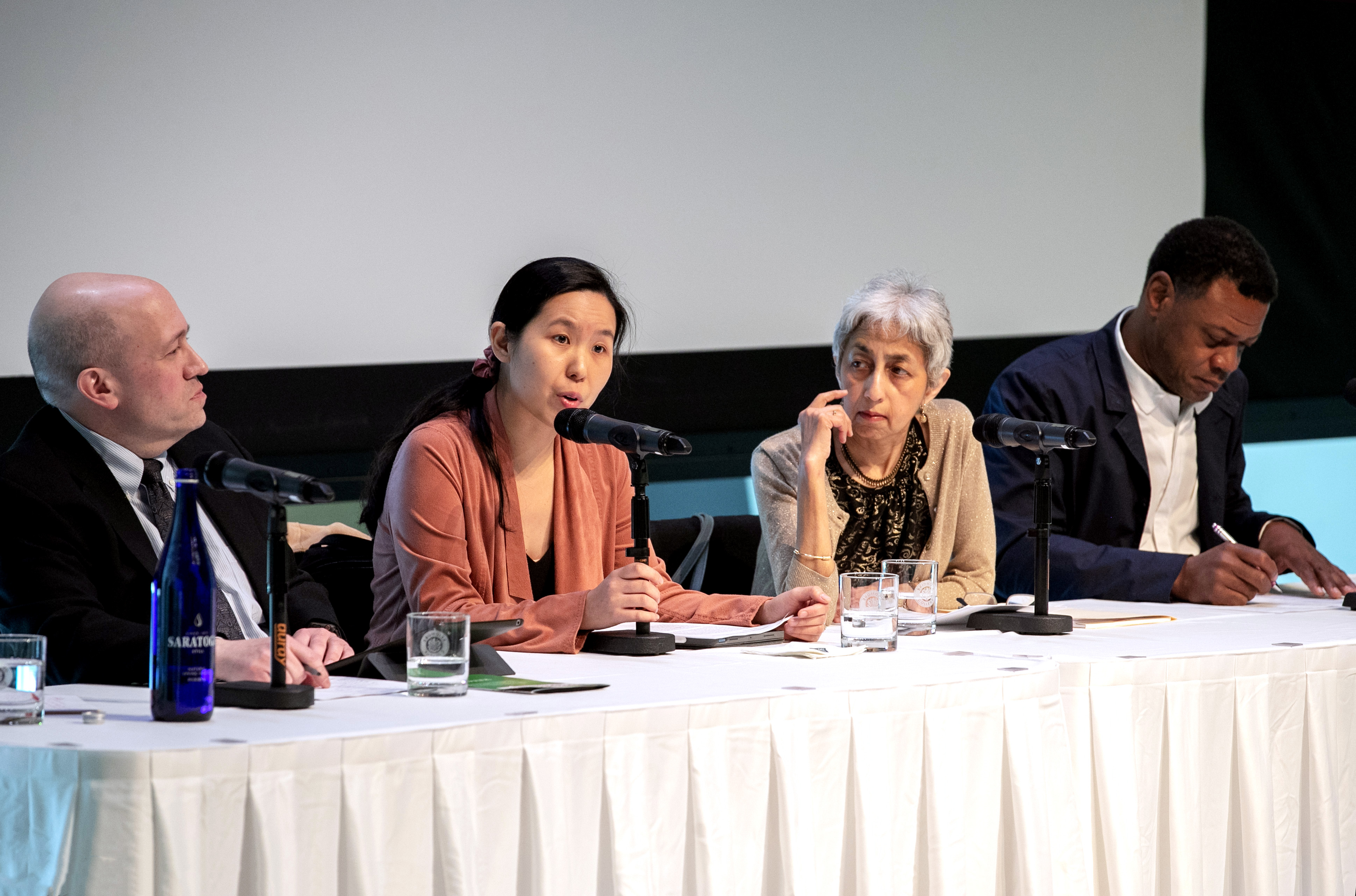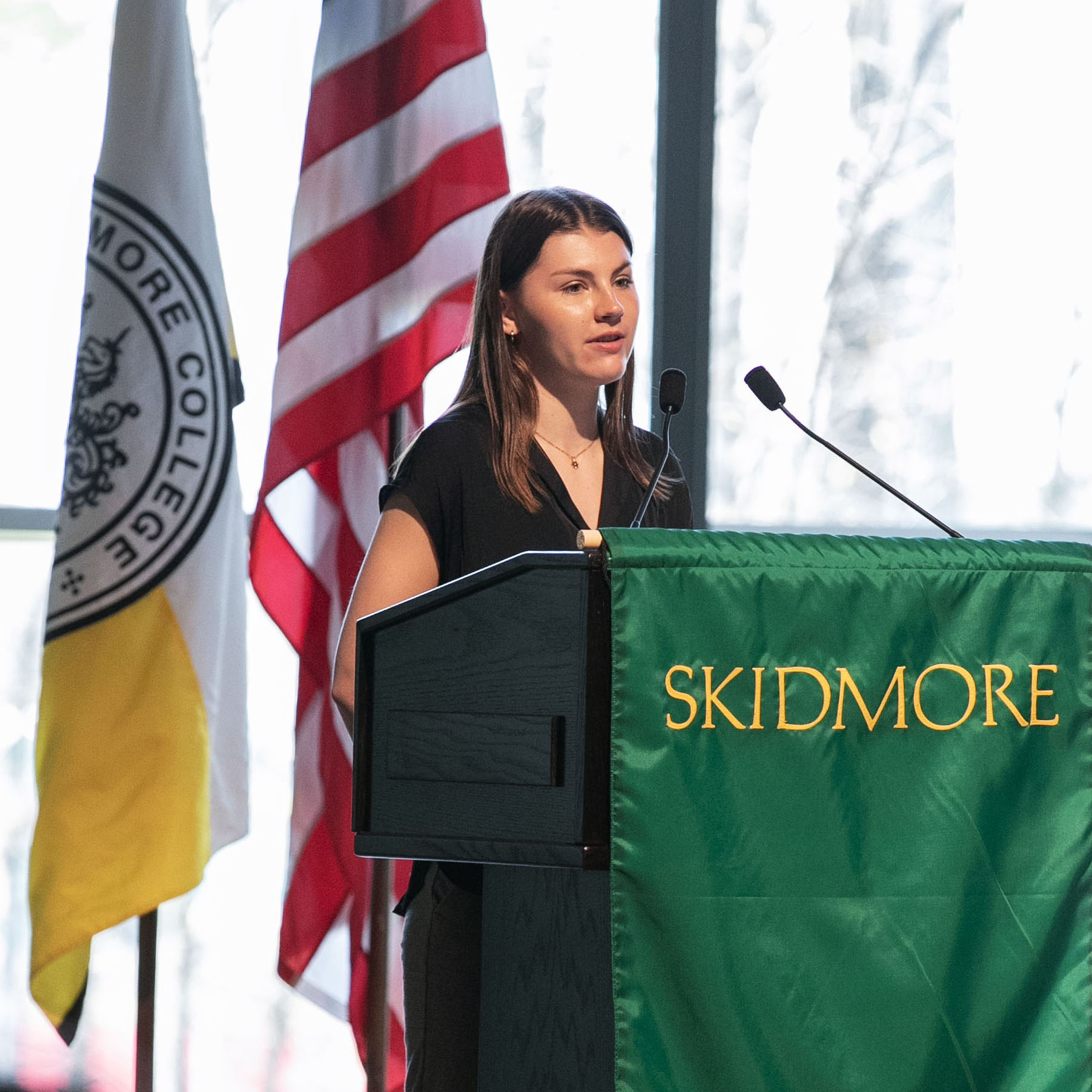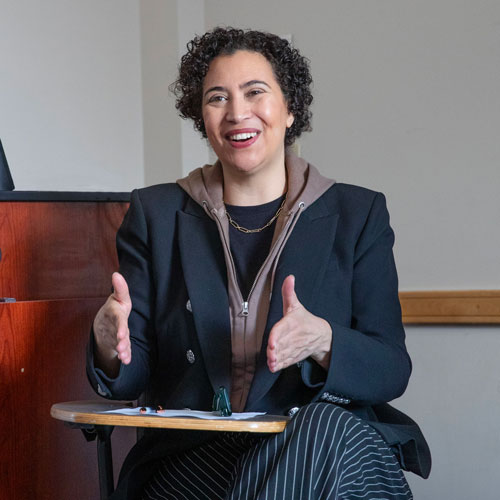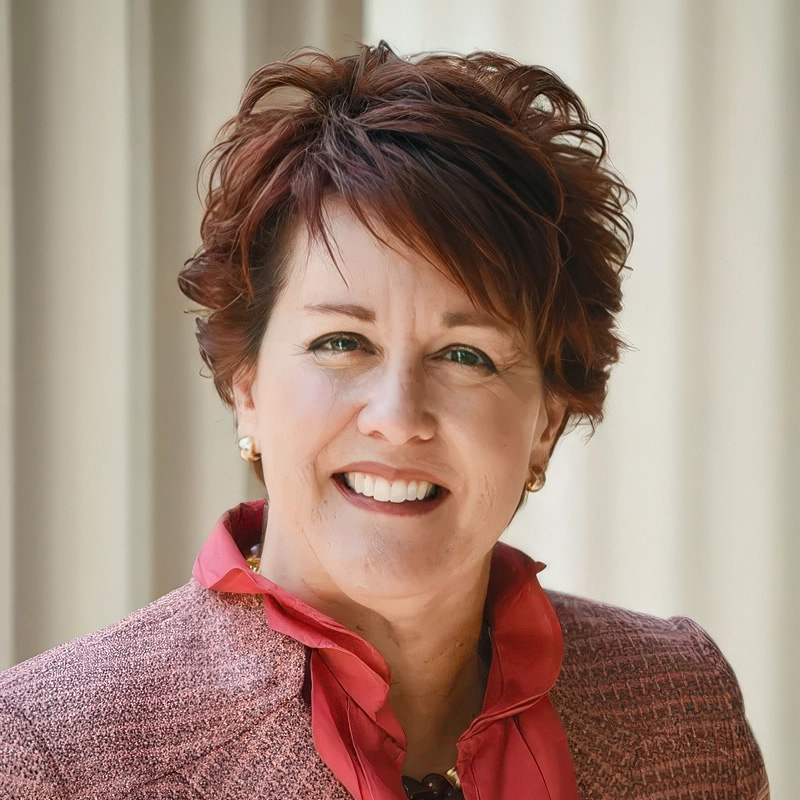Tackling tough topics with respect at heart of speech and expression symposium

How do colleges and universities talk about contentious issues across a deepening political divide? How do campuses promote the free exchange of ideas in an age of social media and artificial intelligence? Is it possible to stave off further polarization? Have colleges become overly “woke,” do we need safe spaces on campus, and is democracy even worth it?
These questions were among the many challenging issues that leading academics, public intellectuals (including New York Times columnist David Brooks), and Skidmore faculty and students engaged and debated at the Speech and Expression on College Campuses Symposium, April 14-15.
The topics were challenging, views were divergent, and answers were not always clear. And the program’s organizer, Skidmore College President Marc C. Conner, wouldn’t want it any other way.
“The hope was just to do it — to spend a weekend talking about speech and expression,” Conner said. “This is the age in which we live: Polarization. Intolerance. The Manichean world of us versus them. All intensified by the phenomenon of social media … Students today are coming into their political consciousness in this environment. We have an uphill battle to convince them that this is not the way democracy works.”

From left, Danielle Allen, James Bryant Conant University Professor and director of the Edmond and Lily Safra Center for Ethics at Harvard University; Michael Roth, president of Wesleyan University; and New York Times Columnist, author, and commentator David Brooks each spoke at the symposium.
Presenting an alternative — a positive model of dialogue and democracy in action — was what the high-profile, two-day symposium at the Arthur Zankel Music Center was all about. Through their participation, panelists showed their collective commitment to the robust and respectful exchange of ideas while exploring ways to safeguard free speech and expression in an increasingly charged environment.
Danielle Allen, James Bryant Conant University Professor and director of the Edmond and Lily Safra Center for Ethics at Harvard University, opened the symposium on Friday, April 15, by citing statistics showing fewer younger people deemed it essential to live in a democracy. Allen explained why democracy matters.
“Democracy is the only structure of government that gives us the space to govern ourselves and our private lives, and the opportunity to govern with others together in our public lives, so we can work together, we can co-create the laws, the norms, and the constraints that shape and structure the world we share,” Allen said in her keynote address on Friday, April 14. “Only democracy is designed to ask to activate human beings as a creatures of purposes and judgment that we are. That's why democracy matters, why it's precious, why preserving it is worth our energy and our commitment, our stamina.”
At the same time, Allen said it was unrealistic to expect disagreement to go away.
When you empower people to govern together, you will have disagreement by definition, so a love of democracy has to bring with it a love of disagreement.Danielle AllenHarvard University
A panel of Skidmore faculty moderated by Professor of English Calvin Baker started a full and lively day of conversations on Saturday, April 15. Associate Professor of Political Science Flagg Taylor offered philosophical insight as he drew on lessons from Plato, the abolitionist Frederick Douglass, and Taylor’s own course at Skidmore, Free and Civil Speech. Senior Teaching Professor of International Affairs and Arts Administration Scott Mulligan spoke from a legal perspective. Even as social media and artificial intelligence make it easier to disseminate falsehoods, Mulligan argued that silencing speech on campus usually ended up doing more harm than good. Associate Professor of History and Frances Young Tang '61 Chair in Chinese Studies Jenny Day described the complexities posed by globalization, Skidmore’s charge to educate students as global citizens, and the pressures that international students face.
“If we can't even talk to one another on a college campus like this one and find common ground, there's no chance when our students are in the world for them to change their minds or our own minds,” she said.
Pushkala Prasad, Zankel Professor of Management for Liberal Arts Students, described campus “meltdowns” surrounding speakers or language used in the classroom that have become commonplace in recent years and called for colleges to engage in “serious and sustained dialogue” to diffuse tensions.
“The world we live in is a tough and frequently disturbing one. Whitewashing it in the name of creating a safe space is likely to fail our students by sheltering them from the misfortunes of life and preventing them from developing much-needed resilience,” Prasad said.
By design, disagreement was part of the symposium.
Michael Roth, president of Wesleyan University, offered a different perspective based on his recent book, “Safe Enough Spaces: A Pragmatist’s Approach to Inclusion, Free Speech, and Political Correctness.” Roth said policies about free speech itself weren’t sufficient and that colleges should also teach discernment amid a growing avalanche of information available online.
“We have to make nuanced judgements about what is safe enough to learn. Procedures aren’t enough,” he said at a lunch plenary session.
For President Conner, a highpoint of the program was a morning panel of Skidmore students, moderated by Dean of Students and Vice President for Student Affairs Adrian Bautista, that tackled some of the most pressing issues at the intersection of free speech and higher education. Business major and Spanish minor Morgan Sickels '23 discussed Generation Z’s mistrust of institutions. Melanie Nolan '23, an English major and intergroup relations minor, described her experience as an intern with the Foundation for Individual Rights and Expression (FIRE) and the free speech-themed art exhibition that she organized on campus. In her talk, “The Reality of Wokeism in Higher Education,” business major and sociology minor Kiryat Hance '23 looked at ways of balancing commitment to inclusion in the classroom with simultaneous questions of cancel culture and commitment to free expression. Amr Fatafta '23, biology major and business minor, considered censorship of discourse at universities.
“Humbly, education asks that, before you claim to know the truth, you need to understand more than just your side,” observed political science major Joshua Cherry '23, who bemoaned the prospect of declining intellectual diversity in college classrooms and self-censorship.
Our comfort zone is a beautiful thing, but nothing can grow there. The more we grow comfortable with being uncomfortable, the more we give ourselves space to learn and to grow.Joshua Cherry '23
At the end of two intensive days of challenging conversations, David Brooks recounted how his own political views have evolved throughout his lifetime and made the case for treating each other with respect.
“As one conversation expert told me, ‘Respect in a conversation is like air: When it’s present, no one notices; when it’s absent, it’s all anyone can think about,’” Brooks told a packed concert hall. “No matter how hard people are in these hard conversations, with a little show of respect, a little honoring, a little genuine curiosity, you can break down even the most hostile person and you really can have good conversations … I’ve learned that wise people are not sages like Yoda who give you give you sensible advice; wise people are people who really hear you.”
In his concluding remarks, President Conner noted that "we began this symposium with a focus on speech and expression; we end it with a focus on listening, which is probably the skill we need to develop most to safeguard the democratic principles on which we depend.”
Visit Skidmore's Speech and Expression website for more information, including video recordings of the symposium.



